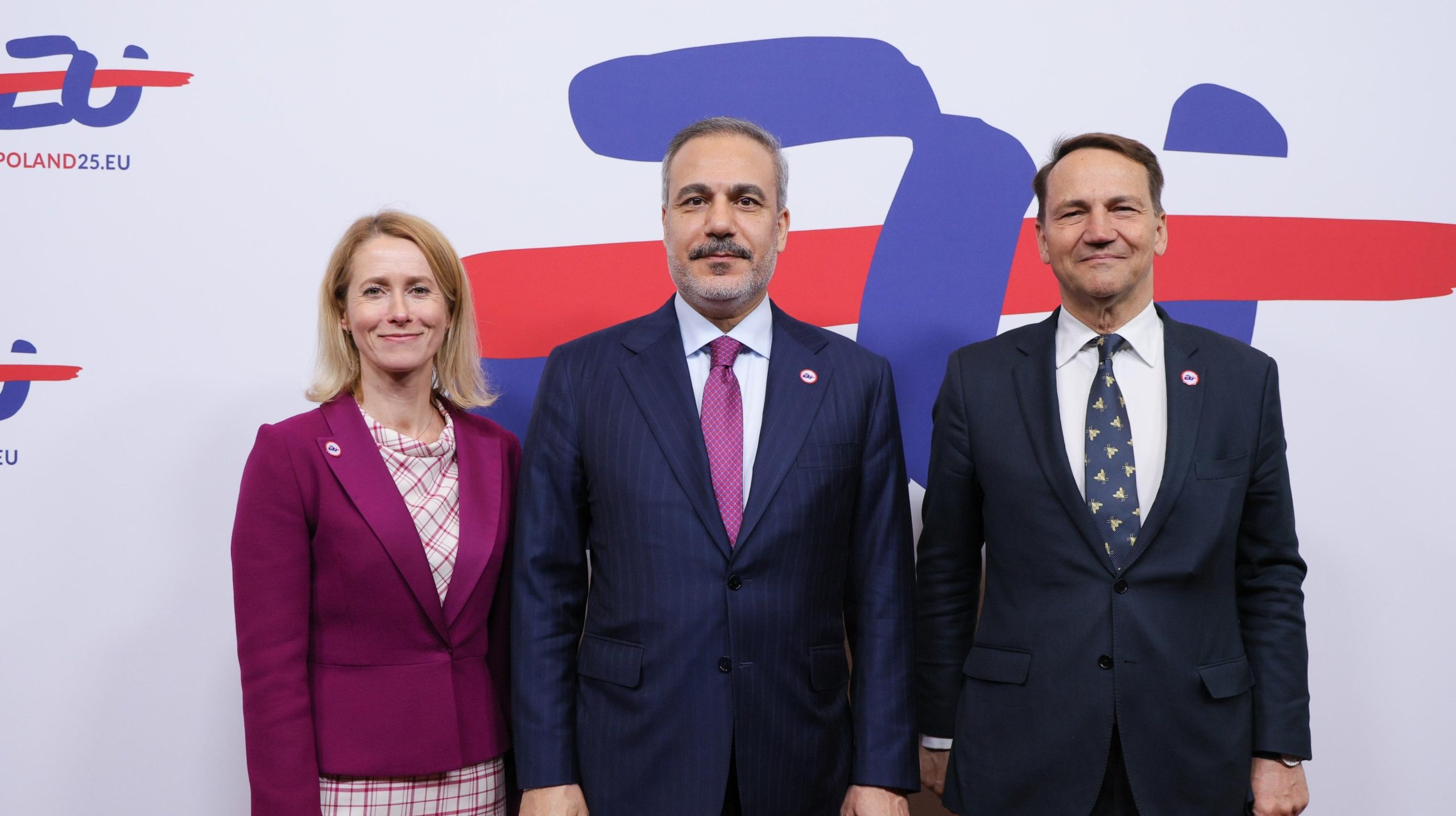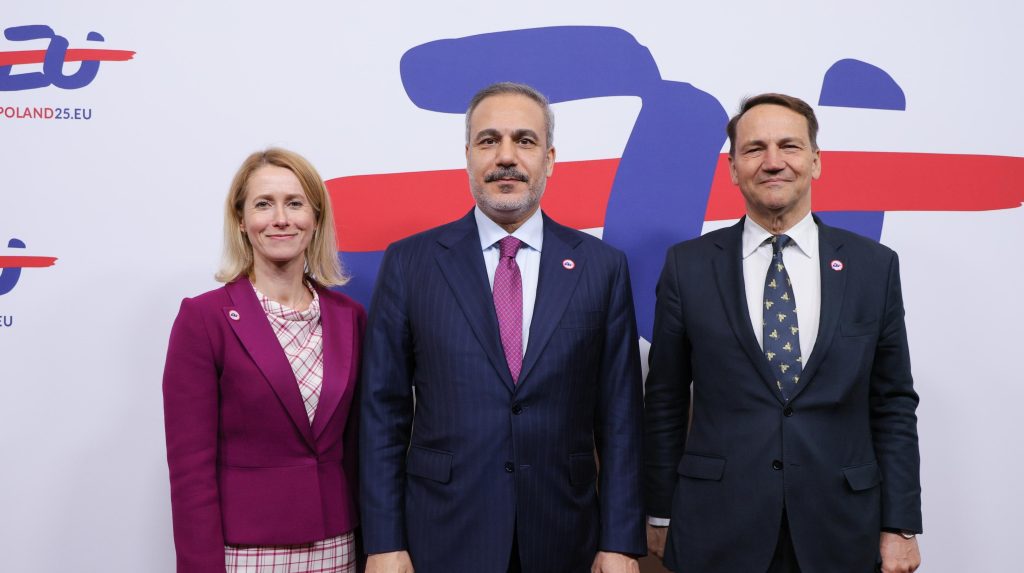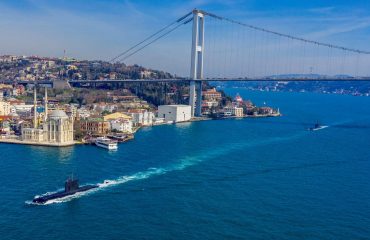

Turkish FM Fidan between the Foreign and Security Policy chief Kaja Kallas (L) and Polish FM Radoslaw Sikorski during the Gymnich meeting in Waesaw on May 8.
On May 7, the European Parliament approved, by majority vote, the report of Türkiye rapporteur Nacho Sánchez Amor during its session in Strasbourg. The report largely reiterates concerns that have been voiced since 2018. It emphasizes that Türkiye’s democratic standards have significantly deteriorated due to its counter-terrorism legislation, the lack of cooperation between Turkish law enforcement and European institutions, restrictions on freedom of expression, and politically motivated detentions. Under these conditions, the report argues that Türkiye’s EU membership is out of the question and that even the continuation of accession negotiations is deemed unfeasible.
The Turkish Ministry of Foreign Affairs responded strongly to the decision, particularly objecting to the report’s reference to President Recep Tayyip Erdoğan’s recent visit to the Turkish Republic of Northern Cyprus (TRNC) as an act of occupation.
While the report constitutes a significant warning, it is neither new nor legally binding. Even in this period when global security priorities have moved to the forefront, European politicians and bureaucrats remain reluctant to include a country like Türkiye, in its current state, within their circle. However, contrary to some portrayals in the media, this does not mean that EU–Türkiye relations have completely broken down. Particularly with the possibility of Donald Trump’s return to the White House, Türkiye is pursuing a recalibrated relationship dynamic with Europe and the broader international community—one increasingly grounded in the realm of security.
Hakan Fidan at the EU meeting
Had EU–Türkiye relations truly collapsed, Turkish Foreign Minister Hakan Fidan would not have been invited, just one day after the adoption of the European Parliament’s report, on May 8, to attend the Informal Meeting of EU Foreign Ministers (Gymnich), held in Warsaw under the presidency of Poland. His participation, accompanied by a high-level delegation, underscores a more complex reality in bilateral ties.
There are several strategic reasons behind Fidan’s invitation. First and foremost, in the event of a potential peace agreement between Ukraine and Russia, the European Union may prefer the presence of Turkish troops over those of Vladimir Putin’s Russia, as part of a possible peacekeeping force. Moreover, the post-conflict security architecture of the Black Sea is likely to rely significantly on the Turkish navy. Despite Türkiye’s limited capacity to exert control over energy resources or secure strategic dominance in Syria due to its economic constraints, it remains a key regional actor with substantial geopolitical leverage.
EU–NATO cooperation and Türkiye
During the Warsaw meeting, Hakan Fidan reportedly emphasized Türkiye’s indispensable contribution to the EU–NATO strategic partnership, particularly underlining Türkiye’s counterterrorism expertise as a NATO member critical to European security. Polish Foreign Minister Radosław Sikorski told journalists after the meeting that Türkiye could also be useful in the Russia-Ukraine crisis. “If the US steps away, there is Turkey, which keeps the channels of communication open with both sides,” he said. 22 of the EU’s member states are also members of NATO, and a significant portion of military cooperation between the EU and its partners takes place under the NATO umbrella.
In this context, if Türkiye can temporarily set aside its bilateral disputes with the EU, it could serve as a strategic bridge between the United States and the European Union. In short, although relations between Türkiye and the EU remain below zero in political and normative terms—and may not improve through developments such as customs union modernization or visa liberalization—security-centred collaboration could at least elevate them to the level seen before, for instance, March 19 and the Ekrem İmamoğlu decision.
Security cooperation and its future
The security partnership between the European Union and Türkiye is not a recent development, although it has only recently come to the forefront of public attention. It has deep historical roots. Despite current discourse that portrays Türkiye as a country that might be included in the European security architecture, Türkiye is already a part of this structure, anchored not only by its strategic geography but also by its extended sphere of influence across the Balkans.
For instance, Türkiye is a key state on NATO’s southeastern flank, providing critical strategic depth for European defence. Through structures such as NATO’s Allied Land Command (LANDCOM) based in İzmir, Türkiye maintains direct military engagement with EU countries. Recently, the Turkish Ministry of Defence announced the appointment of the first Turkish officer to serve as a director at NATO, where he will head the “Cooperation and Security” unit.
From a technical standpoint, Türkiye occupies the role of a transit country in numerous intelligence-sharing and logistical operations between NATO and the EU. Through its participation in NATO missions such as those in Kosovo, Afghanistan, Iraq (train-and-equip programs), and the Baltic Air Policing initiative, Türkiye has developed joint operational experience with EU member states, positioning it not as an external contributor but as a reliable and preferable security partner for Europe.
Europe arms market
In an era marked by complex, multi-theatre, and simultaneous global conflicts, security-focused cooperation between Türkiye and the EU is likely to expand. For example, in the domain of C4ISR systems (Command, Control, Communications, Computers, Intelligence, Surveillance, and Reconnaissance), Türkiye already possesses platforms compatible with those of certain EU countries. However, current limitations in system integration remain a challenge—one that may be addressed in future interoperability efforts.
Although Türkiye is currently excluded from EU defence mechanisms such as the European Defence Fund (EDF) and Permanent Structured Cooperation (PESCO) due to political considerations, recent developments show promise. A notable example is the defence industry agreement between Türkiye and Italy, which demonstrated that Turkish firms—if not independently, then through partnerships—can access the European defence market.
Similarly, discussions on cyber security cooperation are increasingly present on both the European and Turkish policy agendas. Yet, as previously stated, the existing security cooperation framework—even with future enhancements—may only elevate EU–Türkiye relations from their current negative trajectory to a neutral baseline. Expecting more at this stage would be unrealistic.
Perhaps one day, democracy
The establishment of partnerships between Türkiye and the European Union solely in the fields of defence and security is, in itself, not an inherently positive development. Regrettably, however, the current global context and the security-centric nature of the Turkish state structure leave little room for alternatives now.
While hard power alliances—such as military cooperation—can be complemented by soft power initiatives, including the green transition, sustainable energy efforts, youth programs, and joint development projects, it must also be acknowledged that the longevity of such initiatives is inherently limited. Nevertheless, regardless of the circumstances, it is imperative to recognize that Türkiye’s future—culturally as well as economically—is inseparable from that of Europe.
Should the principles of democracy and the rule of law ever be fully realized in Türkiye, it is conceivable that we might then witness a radically different discourse within European Parliament reports. Until that day arrives, however, it appears that clinging to the opportunities currently available remains the only viable course of action.


